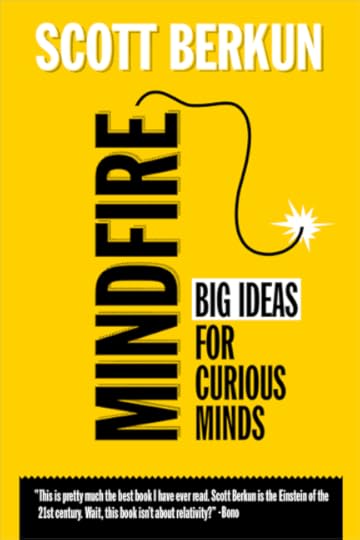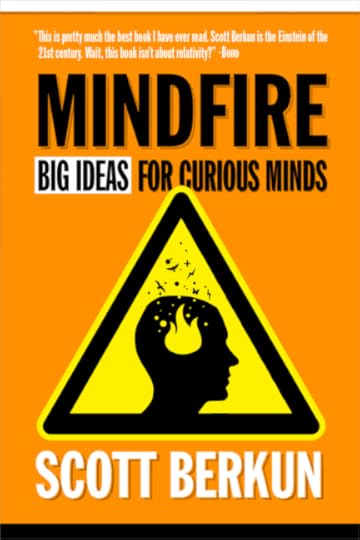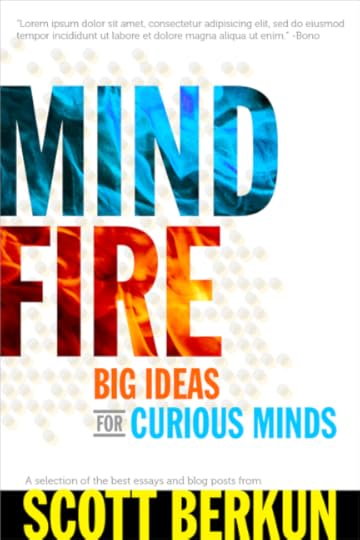Scott Berkun's Blog, page 68
July 21, 2011
Executives and fake decisions
We all do it now and then: we have a decision made in mind, but we ask friends and family for their opinion. Yet the whole time we're confident we're going to stick with our decision no matter what they say. We just want them to feel involved.
Professor Roberto aims directly at managers and calls this the "charade of consultation". It looks like involvement, but it's just for show:
I continue to be amazed at how many executives get themselves into trouble with their teams by engaging in what my friend and colleague Michael Watkins calls the "charade of consultation." The charade occurs when an executive makes a decision, and then goes to his team to "consult" them about the issue. The executive might even entertain a discussion of multiple options, yet then steer the dialogue toward the alternative he or she preferred from the outset. Naturally, team members see right through the charade. Such leadership approaches actually diminish trust and commitment.
http://michael-roberto.blogspot.com/2011/07/stop-charade.html
Sometimes we're open to changing our minds, but just aren't convinced by what we hear. But other times we go in knowing all along, it's just for show. Perhaps the answer is to express some level of confidence when involving others. "I'm pretty sure I'm going to do X, but I want to hear your argument for Y." Then opinions can be offered but there's no deception involved.
Related posts:Four ways to big decisions
This week: when the party's over
This week: How to reorganize a team
Do we suck at the basics?
Should managers know how to code?
July 20, 2011
The end of Google Labs
Today Google announced they're closing Google Labs, their collection of living prototypes and experiments. It will be overstated in the press how much this means or doesn't mean. It's common for successful companies to close R&D groups (or more accurately in this case, portals for discovering R&D work), or start them, depending on the winds of politics in the company at the time. The effect of killing or starting these groups is always hard to measure inside, much less outside a company.
I wrote about the futility of having a VP of Innovation and sometimes I feel the same way about research groups. Some groups earn their keep, but few do. It's hard to invent whether you're on the front lines or in ivory towers, and all things equal, I'll put my money on the people on the front line. As I understand Google Labs from their FAQ, it was a place for the world to discover the pet projects employees were working on for their 20% time. How the world will discover these things in the future is something of an unknown.
But what is telling from the short announcement posted today, is how mature Google has become. We have on our hands a very straightforward, positively spun, corporate press release, that reads much like what Microsoft or Procter & Gamble might say:
Last week we explained that we're prioritizing our product efforts. As part of that process, we've decided to wind down Google Labs. While we've learned a huge amount by launching very early prototypes in Labs, we believe that greater focus is crucial if we're to make the most of the extraordinary opportunities ahead.. We'll continue to push speed and innovation—the driving forces behind Google Labs—across all our products, as the early launch of the Google+ field trial last month showed.
When you see phrases like 'extraordinary opportunities', 'prioritizing', 'process' and 'huge amounts of learning', in reference to something being killed, you know you're in the fantasy land of press releases. Winding down sounds oh so graceful, like winding down a party. And mentioning Google+, their current darling, is a well-played card.
And the kicker of course is the by-line:
Posted by Bill Coughran, SVP for Research and Systems Infrastructure
When a company has two levels of VPs (SVP = Senior Vice President) you know the days of free willing autonomy and entrepreneurial inspiration have faded. I remember the day at Microsoft when I learned there were over 100 VPs in the company – My mind was blown – I realized all at once how it was no longer the company that hired me. It had more than tripled in size, and quadrupled in bureaucracy. David, as much as Microsoft was ever a David (see OS/2) , had now become a Goliath.
Success breeds unavoidable changes. Better leaders minimize the downsides, but only so much is possible.
The question is whether the people working at the old company are the right ones to keep working at the new company formed by success of the old. And when the path for how ideas get out the door changes, for better or worse, all the wise creatives ask "where is it exactly that I'm working?" When that path gets too long, it's time to go. Google, despite its size and success, still has a better path for ideas than most corporations in the world, but for anyone who has been there long enough, that might not be good enough.
Related posts:Lessons from the browser wars @ Google
Does Google 2008 = Microsoft 1998?
Google's 10 rules compared to Microsoft
Why research labs fail at innovation
Me, Microsoft and Digg.com
Nothing is obvious to everyone
Nothing is obvious to everyone, but everything is obvious to someone. These two facts are something Socrates might have said. It's simple and true, but easy to forget. Once we learn how to ride a bike, we forget how long it took to learn. There can be value in forgetting, or remembering, depending on how you look at things.
In this post about Math, it's offered that things don't seem simple until they are understood:
It's a common malady of myself and my friends who study mathematics to think that we're stupid because it's taken so long to understand something so simple. As I recalled all this occurrences I had a new epiphany: It suddenly seems simple because we suddenly understand it.
But the opposite is also true.
Until you understand how something works, it can't seem complex. I drove manual transmission for years before I knew what a clutch actually did. It was just a lever I pushed with my foot that left me go faster. I'd never seen the gears, or a clutch mechanism, so in my mind it was simple.
But one day, out of curiosity, I read about how a clutch works. And transmissions. Not being mechanically inclined, it was complicated. Previously in my mind, the pedal was the clutch. But it turned out the clutch was something specific, and complex, that the lever merely activated. I could never have invented such a thing, much less constructed or fixed it.
If you study any trivial thing with persistence you will find complexity. Atoms yields quarks. Blood yields DNA. The more carefully you look, the more questions you find.
Everything is simple and complex at the same time.
Related posts:Why it's ok to be obvious
Clients who ignore you: how to handle?
Why do essay collection books suck?
How to call bullshit on a guru
Two kinds of people: complexifiers and simplifiers
July 19, 2011
Are PMs worth more than game designers?
It's daft to put faith in any single study, especially ones that make you and your profession look good. Confirmation bias, or finding the first example that supports your beliefs and running with it, is an easy trap.
Rather than point to this as evidence for why project managers or designers are most important (which is dubious – they're both important), I do find the question itself interesting. It's an attempt at a Moneyball, or +/- analysis, for creative teams.
Mr Mollick found that some 30% of differences in revenue between games could be attributed to the producer and the designer alone; and that the lion's share of this variation was due to the producer. The boring project manager, in other words, meant more to the success or failure of the project than did the flashy designer. Moreover, the effect seemed to persist even as the individuals moved on to other projects, so more than one game could benefit from the same competent producer.
via Business-school research: Game changers (From the Economist).
You can read the actual paper here.
Related posts:Failure: the secret to success (Honda & race cars)
Are you a leader or a tracker?
Why designers fail: the report
The best innovation paper you've never read
Great management in progress: NBA playoffs
July 18, 2011
Cover designs for Mindfire: vote!
In my continuing quest to involve you folks in the process of making this book, it's time to look at some cover design ideas. For those who haven't been following, the book is fun collection of provocative essays.
If you want to be notified when the book is out: join the list.
These are not final designs – they're round two. I've worked with Tim Kordik on exploring different directions and these were the three most different – I'm sharing with you to get the best feedback possible.
How to Vote
Our goals are: 1) simple & bold 2) Easy to read from far away 3) Positive & interesting
The blurbs and other details are placeholders (hopefully this is obvious)
We want feedback on direction – these are not final designs
First impressions weigh heavily: don't think too much
Comments welcome: be constructive please
Design A: Dynamite

Design B: Triangle

Design C: Blue flame

View This Poll
Related posts:Berkun down under: Sept. workshops in Australia
Confessions (new book cover and more)
Help wanted: designer for next book (updated)
UI makeover: del.icio.us
Saving the world by laptop
The new book is on its way: update soon
A few weeks ago I reported the results from your votes on the title for the next book. The winning title was MindFire: Big Ideas for Curious Minds.
Since then the book has been rolling along. Later today I'll have an update on the cover and interior design, and let you folks vote on which direction we should go in.
As a self-published book, I have more flexibility on timing, but right now we'll lining things up for a mid-September release. Say tuned later today for more.
Related posts:Update on my next book
New update on the next book
Making things happen – the cover & more
the innovation book, sighting at e-tech
Book update: inside scoop + 1st draft complete
July 15, 2011
The Paradox of Creative Confidence
To get off the couch and do something interesting requires confidence. The more interesting the thing, the more confidence you need. But if you have too much confidence, you'll be blind to the lessons you need to learn to make something as good as what you imagined in your mind.
But if you have too little confidence, you either won't get off the couch, or you'll give up when you hit your first wall. And no interesting thing is finished without hitting some walls.
The paradox is to be confident, but not confident. Or to posses the self-control to make yourself confident, or doubtful, whenever you wish, mastering the tightrope of your own mind.
People who make good things walk this tightrope all the time.
Related posts:Arrogance vs. Confidence: what's the difference?
This week: Figuring out lessons to learn
Sent PM proposal
A rant about women
July 11, 2011
Get the best of Berkun, every month, for free
If you follow along, but find RSS, or twitter or the other zillion ways you can follow me too annoying, I have a free email service that's free and fun.
Every month I write a short newsletter with the top 5 posts (based on traffic) from the previous month, news about tour dates, new books and other surprises (including special offers for fans). It's always short, entertaining and full of goodness.
To sign up, just drop your info here:
Name:
Email:
You can read my privacy policy + every email has an unsubscribe link that actually works.
Mailing list service provided by the well respected campaignmonitor.com.
Related posts:privacy and comments policy
Have a novel in you? Prove it (National novel writing month)
Free book for startups: special offer
Melbourne meetup – Sunday!
Live webcast: How progress happens, Free! March 19th
July 4, 2011
Even Jefferson had second drafts
After a writer is successful, and their works enter the canon, we quietly assume their work could not have been written any other way. That is until we study how they made their famous works. One reason I made the time-lapsed video of writing an essay is to show how much change is involved in writing even short pieces.
Here you can see one of Jefferson's drafts of the U.S. Declaration of Independence. He wrote several, and reviewed the document in detail with the Committee of Five. It's unclear how many revisions or discussions they had, but it's clear the document is a product of thoughtful revision.

You can see the full transcript of the above version of the Declaration.
Related posts:Reading the the U.S. Constitution
From here to publication
Chapter 4: London
Wednesday linkfest
July 1, 2011
The Tree of Life: Movie Review
I like Terrence Malick films, but I don't recommend them for everyone. The Thin Red Line is one of my favorite movies of all time. It's up there with Fight Club and Memento in the short list of films I've seen a dozen times or more. His latest film just came out, called The Tree of Life, staring Brad Pitt.
The problem with his movies for most people, particularly The Thin Red Line and Tree of Life, is they are long, abstract, non-linear and have fuzzy narrative structures that intentionally defy easy comprehension. They are not sitcoms or thrillers: you have to put more of your attention in to get something out. The upside is every moment in his films is beautiful and unusual. He reaches as far as he can with the medium of film to express ideas and feelings hard to capture any other way. If you made it through Koyaanisqatsi, Mallick is easy to watch, as there is comparatively lots of narrative – but most people don't make it all the way through Koyaanisqatsi. In fact in the matinée showing I saw of Tree of Life, one couple got up and left half-way through.
Actual review starts here: The main story is about a boy growing up in Texas (played as an adult by Sean Penn) in the 1950s, with an overbearing father and a loving, but submissive mother, and how they deal with joy and crisis in their lives. Like 2001: a Space Odyssey, there are many scenes wrapped around this story that are abstract, and about the nature of life and the history of the universe. The movie wanders in and out of the main story in epic, but sometimes disorienting fashion. Many epic themes: fathers, mothers, doors, trees (no surprise, love, hate, birth and death. The mystery of grace, a theme of the Thin Red Line as well, is central here as well.
And there's something about how he films people that feels like memory. The camera moves in unusual, but not distracting, over-the shoulder ways. His colors and textures magically feel more like my own memories of childhood, warm and slightly worn out, rather than the perfectly sharp and clean feeling most films have.
Every negative review I've read of the movie is accurate. Mallick could use a sense of humor. His vision is overbearing and relentless. But so are the positive ones: he makes art unlike what you will find from Hollywood. He offers a different kind of uplifting experience in the theater. Something about his films acts like a seed in the mind, growing in potency after you leave. There were moments in the film I've been thinking about again and again since I left, and the stretches where I felt bored have been reduced away. Unlike most movies where the pleasure is only found in the watching, Tree of Life, if you have the patience, pays off in the thinking and feeling for long after you leave the theater.
Trailer below – it's in limited run in the U.S. – if you're interested, definitely worth seeing in the theater. You can find a list of theaters where it's playing by zip code:
Related posts:Movie Review: Winters Bone
Into the Wild: movie review (& more)
Willy Wonka in Smell-O-Vision: review
How to watch a Michael Bay film
The Social Network: movie review



